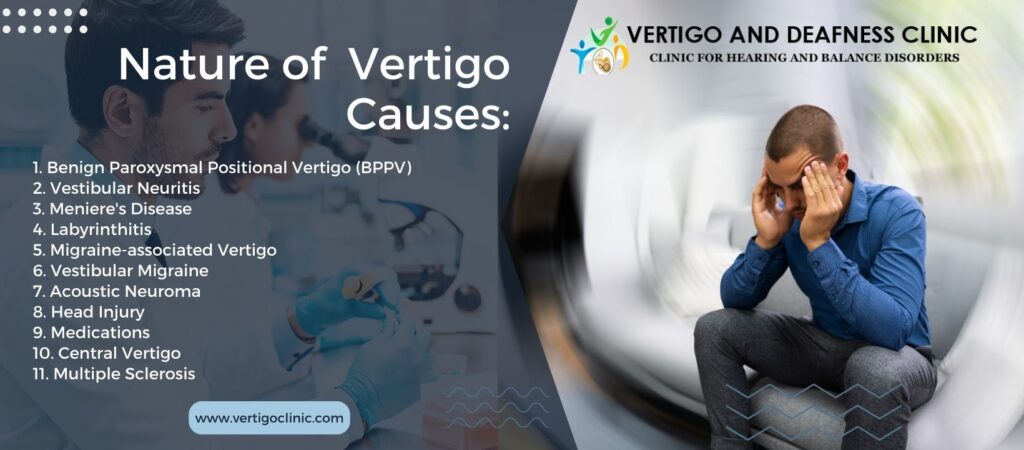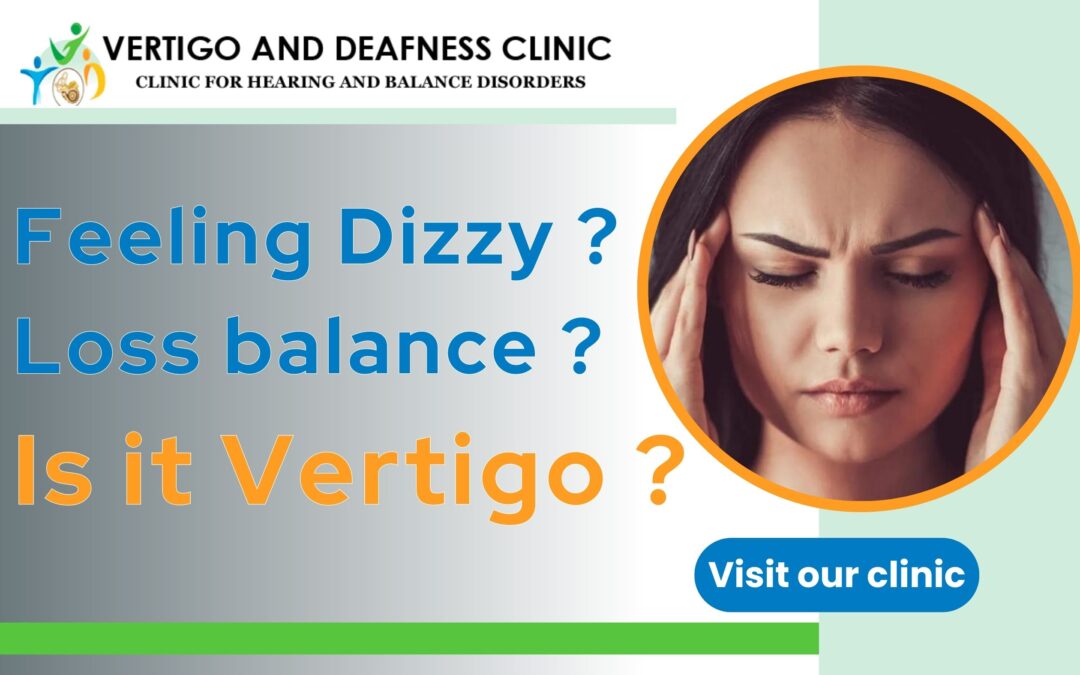Introduction:
Vertigo is an often misdiagnosed illness characterized by an uncomfortable spinning or whirling feeling that may arise without any physical movement whatsoever. Although vertigo itself isn’t considered a separate medical condition, understanding its various causes is key to getting accurate diagnoses and effective treatments.
Vertigo may stem from any number of sources and its causes can either be peripheral or central. Some causes relate to the inner part of the ear which maintains equilibrium; these disorders include benign paroxysmal vertigo (BPPV), Meniere’s disease vestibular neuritis and Labyrinthitis. Central causes, on the other hand, include migraines, strokes multiple sclerosis tumors among others.
Causes:

Vertigo and Deafness Causes:
Deafness and vertigo can be symptoms of distress that indicate an underlying auditory or inner ear health problem, potentially impacting balance, spatial orientation and overall well-being. Their presence can significantly interfere with an individual’s life as these issues can impact balance, spatial orientation and general well-being – many possible causes can contribute to deafness/vertigo such as inner ear issues as well as general health conditions – so being aware of potential causes is key for accurate diagnosis and effective treatment.
Meniere’s Disease: Meniere’s is an inner ear condition caused by fluid build-up that can lead to vertigo, hearing loss and Tinnitus symptoms.
Vestibular Schwannoma (Acoustic neuroma): This benign tumor of the vestibular nerve causes strain to both its vestibular system and auditory nerve, leading to vertigo as well as deafness.
Autoimmune Inner Ear Disease (AIED), is an autoimmune condition wherein the immune system attacks the inner ear, leading to inflammation and damage of auditory and vestibular systems.
Infections: Viral and bacteria-related infections of the inner vestibular nerve or ear can lead to vertigo and deafness, potentially resulting in both vertigo and deafness symptoms.
Head Trauma: Serious head injuries can impact the structures within the inner ear, leading to vertigo and loss of hearing.
Ototoxic Medicines: Certain medicines can have side effects that damage the inner ear, potentially leading to vertigo and deafness.
Genetic Disorders: There are certain genetic conditions which have been linked with vertigo and deafness, such as Usher syndrome.
Finding the source of vertigo and deafness is key to effective treatments, enabling those affected to manage their conditions efficiently and perform at their best in daily life. Early diagnosis and treatment can make a dramatic difference in outcomes for those suffering from these sensory impairments that often go hand in hand.
Symptoms:
One of the hallmark signs of vertigo is an overwhelming sensation of spinning or whirling that results from loss of control and equilibrium, leading to vertigo sufferers experiencing dizziness, disorientation and nausea. Additional symptoms may include sweating, vomiting confusion dizziness disorientation varying according to cause; its duration also can vary significantly between cases.
Vertigo’s complex nature encompasses multiple symptoms, causes, and diagnostic concerns; with an in-depth knowledge of these aspects medical professionals are better equipped to identify its underlying source and develop treatment plans tailored specifically to each patient.
Resolving Vertigo Rehabilitation and Therapeutic Treatment Issues
Vertigo can be an immense obstacle in one’s daily life and severely impact coordination, balance and overall wellness. But those suffering from vertigo do have options; treatment and rehabilitation strategies offer relief to ease discomfort, improve balance and enhance quality of life – as they aim to address its root causes as well as its symptoms.
1. Vestibular Rehabilitation Therapy (VRT):
VRT (vestibular rehabilitation therapy) is an innovative form of therapy focused on maintaining equilibrium through vestibular systems. Performed by experienced occupational or physical therapists, this form of therapy includes tailor-made exercises tailored specifically for each person undergoing VRT sessions, such as eye movements and balance training to gradually challenge and compensate the vestibular system as part of treatment and reduce dizziness effects while also strengthening overall functional capabilities over time.
2. Reposition of the Canalith:
Certain kinds of vertigo, like benign paroxysmal positional vertigo (BPPV), may be successfully managed with repositioning techniques. These procedures involve precise head and body moves performed under medical guidance that aim to manipulate small calcium crystals (canals) within an inner ear canal to reduce discomfort while returning normal functioning to the vestibular system – for example using Epley or Semont actions can bring great relief for people suffering from BPPV-related vertigo.
3. Medication:
In some instances, medication may be necessary to effectively treat vertigo symptoms. Medication may help lessen dizziness or nausea symptoms or address root causes of vertigo. Typical medication prescribed includes verbular stimulants (like benzodiazepines or antihistamines ) as well as anti-nausea drugs. It’s essential to keep in mind that different people react differently to certain drugs as well as having potential side effects which must be closely monitored by medical professionals.
4. Lifestyle modifications:
Implementing certain lifestyle changes could help manage vertigo more effectively, such as eliminating triggers that worsen symptoms like head motions or visual stimuli. Adopting healthy sleeping patterns, managing stress levels effectively, eating healthily and engaging in physical activities regularly are also all ways of improving overall health and managing symptoms more effectively.
5. Counseling and Psychotherapy Services
Vertigo can have serious repercussions for one’s mental and emotional wellbeing, yet many remain unaware. Psychotherapy such as Cognitive-behavioral Therapy (CBT) may help people develop strategies to deal with anxiety or fear associated with vertigo episodes and improve mental health overall. Support groups or counseling sessions with others experiencing vertigo could also provide invaluable help and advice.
Sharing experiences. Supporting emotional needs.
Tip Sharing to Overcome Vertigo Difficulties.
Effective management of vertigo requires an integrated, multidisciplinary strategy. Therapies, rehabilitation methods and medical guidance can assist people living with vertigo take control of their lives, enhance function capabilities and lessen its adverse effects. By following proper treatments and guidance people can improve overall health as they overcome any complications caused by vertigo.
Vestibular Rehabilitation Therapy: Restoring Balance and Function in Vertigo Patients
Vestibular Rehabilitation Therapy (VRT) is an evidence-based, specialized approach developed to assist individuals suffering from vertigo and balance disorders to regain their balance, reduce dizziness, and enhance quality of life. VRT focuses on the vestibular system – vital in maintaining balance, spatial orientation, coordination and overall quality of life.
VRT is provided by healthcare professionals such as physical or occupational therapists with advanced training in vestibular rehabilitation, such as physical or occupational therapists who specialize in vestibular therapy. VRT entails tailoring an exercise program specifically to an individual based on symptoms, diagnosis and functional limitations – with its ultimate aim being to facilitate brain compensation for vestibular dysfunction while fostering adaptation to this condition.
Vertigo sufferers who invest in VRT may reap several advantages:
Reduce Dizziness and Vertigo Symptoms Now
Improved Balance and Stability
Improve coordination and motor skills
– Increased confidence in performing daily activities
Reduced the Risk of Falls and Injuries
– Improved overall quality of life
Conclusion :
Consultations should take place with healthcare providers experienced in vestibular rehabilitation to assess whether vestibular rehabilitation therapy (VRT) will be suitable for individual cases. With their guidance and expertise, individuals with vertigo can embark on their journey toward improving balance, function, and well-being through VRT.

